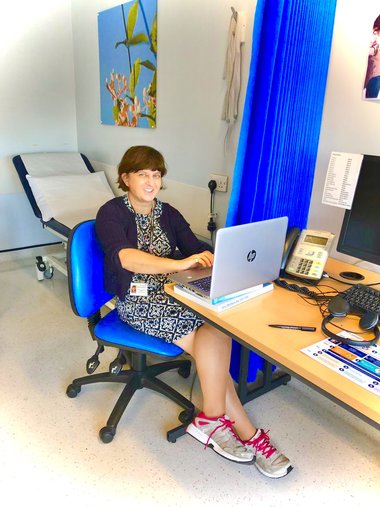16 March 2022
Looking back on International Women’s Day, Emma Yu* caught up with Dr Anita Banerjee** (pictured) to learn more about her multidisciplinary course ‘The Essential Knowledge of Obstetric Medicine’, which is the first of its kind in the UK.
Take me briefly through your journey of how you got here. How did your passion for obstetric medicine start?
My interest began during my undergraduate education, and I spent my registrar and consultant years developing my love of obstetric medicine. As a clinician, I took an interest in pregnant women and specialised in diabetes and endocrinology.
I first took a consultant role in general medicine with an interest in education and looked after pregnant women at the Princess Royal University Hospital (PRUH). Then, I did a split job between the PRUH and Guy's and St Thomas' NHS Foundation Trust from 2011, developing as a consultant on a wide range of issues in medical pregnancy. When I did my own postgraduate certificate and diploma in clinical education, I realised that I wanted to develop a MSc in obstetric medicine.
I understood early on that no one knows everything, but when midwives, obstetricians and physicians work together, the 360-degree lens that collaboration provides makes the journey for pregnant women much better. This led me to developing this module for my peers, trainees, postgraduates, and allied health professionals.
Tell me a bit about maternal services in the UK and the current issues the field is facing with staff shortages.
Maternity has been transforming for the past 20 years. The World Health Organization’s ‘Sustainable Development Goals’ to reduce mortality and morbidity, have had a big impact on maternity services nationally and globally.
The Better Births report from 2016 highlighted that we are working in silos between obstetrics and midwifery. The Maternity Transformation Programme aims to address the issues set out in Better Births. The genesis of maternal networks where we work alongside each other allows us to provide more personalised care and improve the safety of our services.
Additionally, the women we serve are becoming more complex every year. We see more women of advancing age and more women with pre-existing comorbidities.
The workforce crisis has two main focuses: workforce shortages and gaps in skill sets. This means that we often do not have the right people in the right place at the right time—maternity is in turmoil. There have recently been massive maternal enquiries, and these put a strain on the system. Education and training has changed too: over 80% of midwives now do not come from a nursing background (Nursing & Midwifery Council), and they do not have the same understanding of what ‘sick’ looks like.
Overall, these issues are troublesome because as a specialty, we need to remain women-centric to ensure our patients receive the best quality of care.
The COVID-19 pandemic has also affected maternal services, as it has changed the way we consult and use resources. We are learning from this experience and will likely develop a hybrid model in the future. However, we must never forget that seeing someone face to face makes a big difference.
What are the objectives of ‘The Essential Knowledge of Obstetric Medicine’ course? How does it address key issues in the field?
The course objectives include bringing multi-disciplinary teams together. We are fortunate that our course was oversubscribed, and we truly have a multidisciplinary/professional cohort that has built a real comradeship. We have doctors from diverse specialties: anaesthetists, obstetricians and physicians, as well as midwives and pharmacists - all different ages and at varying stages in their careers.
I also hope that through this module, everyone can better understand the lifecycle of a woman. A pregnant woman’s journey starts on the day she is born, to her first period, and to her fertile years. It is important that we start with pre-pregnancy counselling and patient risk assessment, right through to post-partum care.
Tell me more about the interactive case discussions and how they allow for a more in-depth understanding of the topics?
These interactive learning opportunities are important because they help people understand what they know, what someone else knows, and how to bridge that knowledge. We are also seeing people becoming more curious and questioning, which has led to a ripple effect. Participants, including midwives from the high-risk midwife time, have been taking their learning from this course one step further for themselves by sharing with their peers at work.
This group has grown stronger each week through virtual front-loaded lectures, weekly tutorials, and learning sets, and especially through peer learning. Everyone has been really engaged from day one, and no one wants a break even during our long sessions - which is surprising because we come to the course from long days of work.
Learn more about ‘The Essential Knowledge of Obstetric Medicine’ course here.
* Emma Yu is a third-year Boston University student doing a seven-week comms internship with the Women and Children’s Health team, to focus on WCH content for the website and future bulletins.
**Dr Anita Banerjee, Consultant Obstetric Physician, Diabetes and Endocrinology Consultant, Acute Physician and Honorary Senior Lecturer at King’s College London.





